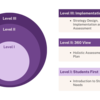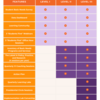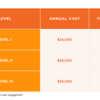We are a leading national action research center redefining what it means to be a student-ready college with a movement centering on students’ basic needs. Our work is firmly grounded in rigorous science, thoughtful practice, and social justice. You’re likely here because you—like us—believe that students are humans first. You also know that basic needs security is central to learning and is critical for student success and degree completion. Making sure students’ basic needs are met is quite simply a moral imperative.

Have questions about HIP or just want to connect?
HIP participation will accelerate the work your institution is already doing to improve student persistence and graduation rates and advance equity goals. Through HIP, you will use real-time data to assess students’ basic needs, campus policies, and programs, while receiving support to analyze, plan, and take action to improve students’ basic needs security and well-being.
Read about our 2022-23 impact:
When you join HIP, you are supported by up-to-date research, evidence, data, best practices, experts, and lessons from peer institutions as you work to better serve your students’ basic needs. When you join HIP, you become part of a values-aligned community committed to reimagining and creating a better future, together.
Join The Hope Center—and 126 institutions (and growing!)—to create change for students on your campus now.
Hear what our institutional partners have to say about HIP:
Del Mar's partnership with the Hope Center gave us the tools to identify where our students need the most assistance. With this initiative, and the data we received, our campus has been able to establish data-drive goals that will revolutionize services we offer so that our students' needs are met. We have also been able to build cross-campus partnerships to ensure goals aligned for the betterment of our students.

Sara King
Director of Student Engagement & Retention at Del Mar College
Experiencing HIP last academic year was phenomenal! The regular check-ins and informational sessions allowed my team to adequately prepare for the survey implementation, which was extremely successful. The data we received from the survey provided us with clear indicators that helped strengthen and frame basic needs support for our students.

Dr. Benita Rashaw
Interim Vice President for Student Affairs at Frederick Community College
Having the opportunity to work with the Hope Center and participating in the Hope Impact Partnership initiative over the past year has allowed Dallas College to be more intentional about understanding the needs of our students and their basic needs insecurities. Additionally, having the opportunity to disseminate the Hope survey and access the new data dashboard, we can take an in-depth look at our data and where we might be able to make more data-informed decisions regarding the overall well-being of our students and the student journey. We enjoy our partnership with the HOPE center and being part of this first cohort of HIP!

Carlos Cruz
Associate Vice Chancellor-Student Wellbeing & Social Support at Dallas College
Our participation as a Level I Hope Impact Partner helped our campus gain valuable insights into our students' basic needs insecurity and take action. Already, we have dismantled systemic barriers to food access at our campus food pantry, expanded availability of hygiene products, and begun to evaluate ways we can provide greater access to mental health services on our campus as a result of the data received through the Basic Needs Survey. Thanks to the support received from the Hope Center throughout the partnership period, our survey return rate was outstanding, helping us educate faculty and staff with valid and reliable data.

Miriam Roccia
Interim Vice Chancellor for Student Affairs at SIUE
Learn More About HIP
We offer three standard partnership levels with assessment, coaching, training, and learning communities to match your team's current goals, strengths, needs, and capacity. Or email us at [click-for-email] for customizable options.


Don't see the combination of activities you need? Email [click-for-email] to discuss customizable options.
The Hope Impact Partnerships fee structure is based on the annual services provided at each level:

The Hope Center recognizes the systemic resource inequities between institutions and offers a fee reduction of $5000 per level, per year for HBCUs, Tribal, and community colleges.
If the three standard HIP levels don't suit your needs, email [click-for-email] to discuss customizable options.
Thank you for your interest in joining HIP! We are excited to support your important work for your students. To indicate your interest and commitment to participating, please complete and submit this enrollment application.
A few recommendations as you get started with your enrollment application:
For guidance on choosing the right HIP level and to learn more about which is best for your institution, please reach out to us at [click-for-email].
Only one form per institution should be submitted.
The enrollment application requires either permission for or completion by an institutional leader who is authorized to approve the terms of the partnership and commit necessary resources.
A downloadable PDF version of the enrollment application is posted here, so you can coordinate with colleagues prior to beginning a submission.
Plan to complete the form in one instance. The application itself will take 10-15 minutes to complete. Your progress will be saved across pages, but only if you are using the same device and browser.
If you have questions before or as you complete the enrollment application, please contact us at [click-for-email].
Upon acceptance to HIP, we will provide an agreement that explicitly details core components for successful implementation and is required to be signed by both parties.
This agreement will include Temple’s IRB approval for the student survey and requires colleges to use Temple’s IRB approval (colleges may not seek their own IRB approval). It also includes a commitment to adhere to the Student Basic Needs Survey guidelines in terms of timeline, content of recruitment materials, and student sample to ensure survey results will not be biased or skewed.
Institutions accepted to participate in HIP will be given a personalized agreement that should be signed within 30 days of receipt. Invoices will follow with a 30-day payment window.
Frequently Asked Questions
Below you'll find answers to common questions we field about HIP. We’d love to discuss how we can help your institution better support your students’ well-being and success. Email us at [click-for-email].
I. General
As a nationally recognized leader in research, policy, and practice, we are uniquely positioned to address college students’ basic needs. Our team has nearly a decade of experience partnering with and supporting institutions to understand their students’ needs; assess current policy, practice, and services; and move toward institutional transformation.
HIP is the only program on the market that offers a comprehensive community of support, uniquely led by a collective of researchers, scholars, storytellers, and policy advocates.
Participating in Hope Impact Partnerships (HIP) provides valuable opportunities to:
All Levels:
- Collect data to understand your students’ basic needs, use of services, and barriers to accessing supports
Connect with fellow institutions pursuing these efforts
Partner with and receive education and training from top experts in student basic needs and institutional transformation
Access this data via an easy-to-use data dashboard with capability to disaggregate your data by student characteristics and view comparisons to similar institutions and receive your dataset for additional analyses
Receive support for translating data to action, including a library of articles, toolkits, and other resources curated to support the growth of your basic needs ecosystem
Levels II & III:
Assemble and/or strengthen an internal task force to drive improvements for students’ basic needs
Convene with your cohort to learn from a diverse range of experts and discuss current policy, practice, and research
Take inventory of strengths and gaps in your student basic needs ecosystem
Receive coaching to action plan for next steps and institutional transformation
Level III: Engage with other institutional leaders at the forefront of basic needs work in co-created learning sessions and capacity-building activities tailored to your specific needs and institutional context
- Institutions that have participated in HIP report that they have increased awareness on their campus around student basic needs, gained buy-in from senior leadership, launched basic needs task forces, secured funding and staff positions, used their basic needs data for strategic institutional decision-making, and more.
- Read more about what partners have to say about HIP in our 2022-2023 Impact Report and on our blog.
Since 2015, we have provided research and training services to over 500 colleges and universities across 49 states. Hope has partnered with over 100 institutions since the launch of HIP in 2022. Our partners include individual institutions, college systems, and statewide coalitions.
II. Enrollment Application & Selection
The enrollment application requires either permission for or completion by an institutional leader who is authorized to approve the terms of the partnership and commit necessary resources. It can be helpful for the current or future campus lead for basic needs work to contribute to the enrollment application.
The three HIP levels are designed to meet institutions where they are on their journey to better supporting students’ basic needs. Our team has developed three partnership levels to support a range of institutional goals, needs, and capacities.
Level I provides a venue for survey data collection and action planning without a significant time commitment.
Level II additionally focuses on the institution as well as the student by collecting student survey data and inventorying basic needs programs and services. Through additional programming and 1:1 coaching, Level II hones in on creating and strengthening cross-campus collaborations and leveraging data for change.
Level III is a more advanced and intensive option for institutions further along on their basic needs programming journey. Level III institutions should have previously collected basic needs data and be underway or ready to design and implement strategies to increase students’ basic needs security and well-being.
Looking for something a little different? If the standard levels don’t meet your needs, reach out and we’ll discuss customizable options for your institution.
III. Assessments
Your institution will email the anonymous survey to all enrolled students. We will provide the survey link, invitation materials, and guidance for achieving a strong response rate. Your role is to send the survey to students using the materials we provide. We have secured IRB approval from Temple University’s IRB, which determined that the research was Exempt. Your institution’s IRB must agree to rely on the Temple University IRB’s determination.
We are thrilled to provide a new Data Dashboard to deliver more timely data to our partner institutions. When contexts and decisions are evolving rapidly, especially as has been the case over the last several years, we know this turnaround time is key.
We also are committed to supporting HIP partners in identifying equity gaps in basic needs insecurity and within the use of support services. The dashboard allows partners to disaggregate the data to uncover differences across student subgroups and drive change with a focus on equitable outcomes.
You will also be able to compare your survey results to aggregate results from other similar institutions.
Your institution will also receive your dataset so that you can conduct additional analyses to support your basic needs efforts.
The survey is fully anonymous, so you will not be able to link the survey data to your college’s administrative (student-level) data. Due to our IRB approval, we do not collect student identifiers.
The Student Basic Needs Survey will give your institution a comprehensive understanding of your students’ experiences with basic needs insecurity, along with the awareness, use, and barriers to accessing basic needs supports. It includes questions on food insecurity, housing insecurity, homelessness, mental health, enrollment patterns, childcare, transportation, technology and internet access, utilization of public benefits and campus programs, support preferences, and barriers to accessing support. There are also demographic questions and response options not typically captured in administrative databases—items like gender identity, sexual orientation, parenting status, and employment status.
The first email invitation is typically sent to all enrolled students during the first four weeks of the term. A follow-up emails is sent once per week for three subsequent weeks. Students who are experiencing food and housing insecurity may drop out early each term, so we encourage institutions to send the survey within the first four weeks of the term to provide a full picture of need. If this timeline doesn’t meet your needs, we will work with you on an alternate plan.
The Student Basic Needs Survey is fielded in the first term of the partnership, so that the data and insights can inform action planning moving forward. For most institutions, this will be in the fall term. We may have another HIP cohort kick off in the spring if there is enough interest. In that case, spring cohort institutions would field the survey in the spring.
The Student Basic Needs Survey is a holistic assessment of students’ basic needs-related experiences. We update our survey regularly to respond to evolving needs of institutions and feedback from our partners and students. Our survey is the most comprehensive basic needs instrument, provides results via a data dashboard (including comparisons to other institutions and disaggregated results by student characteristics) and the dataset, and includes full support from The Hope Center’s interdisciplinary team. Through HIP, institutions receive resources and training for implementing the survey and using the data. The Hope Center maintains the survey and provides a survey link to the institution, provides response rate updates and results, connects institutions to a national cohort of others engaged in the same work, and provides training and support for action planning to leverage data for institutional change.
The Inventory of Basic Needs Programs and Services is a checklist of common basic needs supports. The inventory helps to connect the dots across the various units and groups that may be involved in basic needs efforts across campus. It also allows institutions to compare the needs students report on the survey to the available programs and services. The information you collect will then help inform the development of your campus’s action plan to enhance its basic needs support ecosystem. The inventory is typically conducted in the second semester of the partnership for Level II institutions.
What if we already conduct a basic needs survey and/or completed an inventory of basic needs programs and services?
We want to partner with you to improve your basic needs ecosystem. If the three standard HIP levels are not a good fit for you, just email us at [click-for-email], and we’ll work with you on a customized HIP plan.
IV. Partnership Activities
Level I includes webinars and office hours that match the needs of institutions getting underway in their basic needs work. The webinars coordinate with the survey activities during the year, covering such topics as preparing to launch the Student Basic Needs Survey, understanding your data using the dashboard, leveraging data for change, and funding basic needs efforts. Periodic office hours provide opportunities to connect with The Hope Center team and your HIP cohort for informal, individualized supports. Asynchronous content includes a library of resources on basic needs topics.
Levels II & III training includes a focus on both knowledge and skill development set in a consistent learning community group. It will include the webinars described above, as well as deep-dive webinars and workshops on the latest in policy, practice, and research related to various basic needs topics (e.g., food insecurity, housing insecurity, emergency aid, public benefits), as well as action planning and systems change strategies (e.g., how to use data to build campus momentum for change; communicating with various audiences). Both levels will weave together learning sessions and coaching sessions for an integrated professional development experience. Level III will be more customized to the small cohort and will be more advanced given this Level is geared toward building upon already existing basic needs initiatives on campus.
This year our programming will be aligned with the new CAS Standards for basic needs programs and services, and all HIP partners will be provided with access to the Standards.
Coaching is offered in HIP Levels II & III. Quarterly HIP Coaching will be consistent throughout the partnership and timed in tandem with training and learning community sessions to maximize effectiveness. Coaches support institutions to:
- develop and strengthen cross-department collaboration and/or a formal basic needs working group/task force;
- adapt learning from data collection and trainings to their specific institutional context and students;
- map action plans specific to their institution to drive student impact outcomes; and
- provide customized support to address barriers and build on successes at your institution.
V. Service Agreements & Fees
Of course! The survey has been approved as exempt by Temple University’s IRB. We can provide the determination letter and more information to your IRB. Most institutions’ IRBs agree to refer to the Temple University IRB's determination.
We recognize systemic resource inequities and is offering a reduced fee of $5000 per level per year for HBCUs, tribal colleges, other minority-serving institutions, and community colleges.
There are also reduced fees for institutions who participate as a system or state consortium.
We understand that resources are tight. Many of our partners have used basic needs grants, hunger-free campus funds, and other state, federal, and foundation funding to participate in HIP. We also pursue funding for small cohorts of schools and occasionally have scholarships available. If funding is a barrier for your institution, we encourage you to reach out to [click-for-email] so we can explore different funding options with you.

